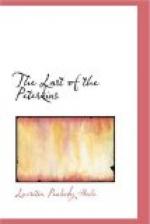It is impossible that much can be known about it. This is why we have taken it up as a subject. We mean the sun that lights us by day and leaves us by night. In the first place, it is so far off. No measuring-tapes could reach it; and both the earth and the sun are moving about so, that it would be difficult to adjust ladders to reach it, if we could. Of course, people have written about it, and there are those who have told us how many miles off it is. But it is a very large number, with a great many figures in it; and though it is taught in most if not all of our public schools, it is a chance if any one of the scholars remembers exactly how much it is.
It is the same with its size. We cannot, as we have said, reach it by ladders to measure it; and if we did reach it, we should have no measuring-tapes large enough, and those that shut up with springs are difficult to use in a high place. We are told, it is true, in a great many of the school-books, the size of the sun; but, again, very few of those who have learned the number have been able to remember it after they have recited it, even if they remembered it then. And almost all of the scholars have lost their school-books, or have neglected to carry them home, and so they are not able to refer to them,—I mean, after leaving school. I must say that is the case with me, I should say with us, though it was different. The older ones gave their school-books to the younger ones, who took them back to school to lose them, or who have destroyed them when there were no younger ones to go to school. I should say there are such families. What I mean is, the fact that in some families there are no younger children to take off the school-books. But even then they are put away on upper shelves, in closets or in attics, and seldom found if wanted,—if then, dusty.
Of course, we all know of a class of persons called astronomers, who might be able to give us information on the subject in hand, and who probably do furnish what information is found in school-books. It should be observed, however, that these astronomers carry on their observations always in the night. Now, it is well known that the sun does not shine in the night. Indeed, that is one of the peculiarities of the night, that there is no sun to light us, so we have to go to bed as long as there is nothing else we can do without its light, unless we use lamps, gas, or kerosene, which is very well for the evening, but would be expensive all night long; the same with candles. How, then, can we depend upon their statements, if not made from their own observation?—I mean, if they never saw the sun?
We cannot expect that astronomers should give us any valuable information with regard to the sun, which they never see, their occupation compelling them to be up at night. It is quite likely that they never see it; for we should not expect them to sit up all day as well as all night, as, under such circumstances, their lives would not last long.




